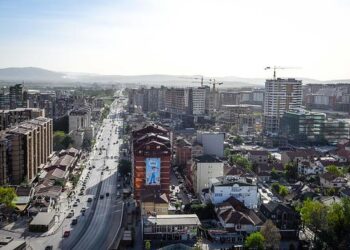The United States has officially suspended its “Strategic Dialogue” with Kosovo, attributing the move to recent actions taken by Kosovo’s Prime Minister Albin Kurti. The decision marks a significant setback in bilateral relations, highlighting growing tensions between Washington and Pristina amid ongoing political and diplomatic challenges in the Balkans. This development raises questions about the future of US engagement in Kosovo and the broader stability of the region.
US Suspends Strategic Dialogue Citing Friction with Kosovo’s Kurti Administration
The United States has officially declared a pause in its strategic dialogue with Kosovo, attributing the decision to ongoing tensions with the administration led by Prime Minister Albin Kurti. Washington expressed concerns over policy choices and public rhetoric emanating from Pristina, which it claims have undermined bilateral cooperation efforts aimed at regional stability and Euro-Atlantic integration. The move represents a significant setback for diplomatic channels that have been central to navigating Kosovo’s delicate relations with neighboring Serbia and managing broader Western Balkan security challenges.
Key factors influencing the suspension include:
- Disputes over normalization talks: Persistent disagreements on negotiating terms with Belgrade, stalling progress.
- Governance and rule of law concerns: Questions raised about Kosovo’s compliance with democratic standards.
- Public statements from Kosovo officials: Perceived inflammatory rhetoric viewed as provocative by U.S. diplomats.
The following table summarizes recent interactions and areas of friction that contributed to the current impasse:
| Issue | U.S. Position | Kurti Administration |
|---|---|---|
| Dialogue with Serbia | Calls for expedited negotiations | Emphasizes sovereignty, delays talks |
| Rule of Law | Demands judicial reforms | Claims progress but resists external pressure |
| Regional Security | Advocates cooperation | Focuses on national interest |
Diplomatic Fallout and Impact on Regional Stability Examined
The suspension of the “Strategic Dialogue” by the US has sent ripples through the already fragile political landscape of the Western Balkans. Washington’s decision, directly attributing blame to Kosovo’s Prime Minister Albin Kurti, marks a significant downturn in diplomatic relations. The move underscores growing frustration over perceived unilateral actions by Pristina that complicate peace efforts with Serbia. Analysts warn that the freeze in high-level engagement may stall crucial reforms and integration processes, potentially emboldening nationalist factions across the region.
Regional stability now faces increased uncertainty, with key implications including:
- Deterioration of US-Kosovo cooperation: Hinders security collaboration and economic partnerships.
- Heightened tensions with Serbia: Risks escalation in stalled normalization talks.
- Impact on EU accession prospects: Weakens momentum towards European integration for both nations.
- Potential shifts in regional alliances: Opens space for alternative external influences, particularly from Russia and China.
| Factor | Potential Effect | Timeline |
|---|---|---|
| Lack of US dialogue | Stagnation of peace talks | Short term (3-6 months) |
| EU mediation pressure | Renewed diplomatic efforts | Mid term (6-12 months) |
| Regional security cooperation | Risk of escalation in hotspots | Ongoing |
Experts Call for Renewed Engagement and Policy Realignment to Restore Bilateral Relations
Amid escalating tensions following the suspension of the US-Kosovo Strategic Dialogue, experts emphasize the urgent need for both parties to recalibrate diplomatic strategies. Analysts argue that a lack of sustained communication has contributed to misunderstandings, threatening the fragile stability in the region. Calls are growing louder for policymakers to prioritize renewed engagement that centers on transparent dialogue and mutual respect, essential for rebuilding trust and cooperation.
Leading voices advocate for a holistic approach involving:
- Inclusive negotiations incorporating diverse political and civil society stakeholders
- Clear timelines for implementing agreed measures to ensure accountability
- Focused confidence-building initiatives aimed at addressing core disputes
To better understand the dimensions of the dispute, the following table outlines key areas needing alignment:
| Issue | Current Status | Recommended Action |
|---|---|---|
| Political Dialogue | Paused | Immediate resumption with mediator facilitation |
| Security Cooperation | Reduced joint efforts | Reinstate joint training and intelligence sharing |
| Economic Collaboration | Stalled development projects | Reopen bilateral trade initiatives |
In Conclusion
The suspension of the US-Kosovo Strategic Dialogue underscores growing tensions between Pristina and Washington amid ongoing political and regional challenges. As both parties navigate this diplomatic impasse, the future of their cooperation remains uncertain, with potential implications for Kosovo’s international standing and the broader stability of the Western Balkans. Observers will be watching closely to see whether dialogue can be resumed and how Kosovo’s leadership responds to mounting international pressure.













